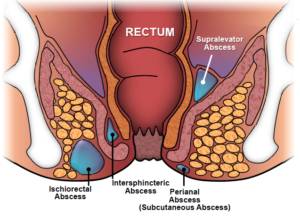Have you ever felt a painful lump near your anus that won’t go away, or noticed a discharge that just keeps coming back? You may be dealing with something more than just a minor infection. One such condition that is often painful, persistent, and quite distressing is anal fistula.
Though not commonly talked about, anal fistulas are becoming increasingly common, and timely diagnosis and treatment are crucial to avoid long-term complications. In this blog, we’ll walk you through what an anal fistula is, its causes, symptoms, and how it is diagnosed.
What is an Anal Fistula?
An anal fistula is a small, infected tunnel that forms between the inside of your anal canal and the skin around your anus. It often begins with an anal abscess — a pocket of pus caused by an infection in the small glands inside the anus. When this abscess doesn’t heal properly, it may result in a fistula.
In simple terms, think of it as a tunnel your body creates as it tries to drain the infection, but instead of healing, the tunnel persists and becomes a chronic issue.
Causes of Anal Fistula: What Leads to It?
There isn’t just one cause of anal fistula — multiple factors can contribute to its development. Some of the most common causes include:
- Perianal abscess: The most common precursor. If an abscess doesn’t heal properly, it can form a fistula.
- Inflammatory bowel diseases: Conditions like Crohn’s disease or ulcerative colitis can inflame the bowels and lead to fistulas.
- Radiation therapy: Especially previous treatments in the pelvic region.
- Hidradenitis suppurativa: A chronic skin condition that causes painful lumps under the skin.
- Tuberculosis: Though rare, TB infections can sometimes affect the anal area.
- Surgical or accidental trauma: Injury or complications from surgery can cause tissue damage leading to fistula formation.
- Chronic constipation or diarrhea: These conditions can irritate and inflame the area, increasing risk.
- Which one is a cause of fistula? → The most common cause is a perianal abscess that fails to heal properly.
- What is the main cause of a bowel fistula? → Chronic inflammatory diseases like Crohn’s disease are often responsible.
Symptoms of Anal Fistula
Many people ignore early symptoms thinking it’s just a minor issue, but recognizing signs early is crucial for effective treatment.
Common symptoms include:
- Persistent anal pain: This may worsen while sitting, walking, or during bowel movements.
- Swelling and redness: The area around the anus becomes tender and inflamed.
- Drainage of pus or blood: Often foul-smelling, this drainage may continue even after initial treatment.
- Recurring abscesses: If an abscess keeps coming back, it may be a sign of a fistula.
- Itching and skin irritation: Due to persistent leakage and moisture around the anal region.
- Fever and chills: Especially during an active infection phase.
- Pain during bowel movement: Caused by internal pressure or inflammation.
How Do You Confirm If You Have a Fistula?
Diagnosing an anal fistula may sound intimidating, but it’s a necessary step toward healing. A combination of clinical observation and imaging tools is used:
- Physical Examination
Your doctor will look for visible signs of an opening or discharge around the anus.
- Digital Rectal Exam (DRE)
The doctor gently inserts a finger into the rectum to check for abnormalities.
- Fistula Probe
A thin, sterile tool may be inserted to trace the path of the fistula.
- Anoscopy
A small tube-like instrument is used to view the inside of the anal canal.
- Imaging Tests
Tests like MRI, CT scans may be used to locate deep or complex fistulas.
How do you confirm if you have a fistula?
→ Through physical exam, imaging, and sometimes a probe or anoscopy.
Complications of an Untreated Anal Fistula
Ignoring a fistula or relying only on temporary relief methods can lead to severe issues:
- Recurring infections and abscesses
- Anal stenosis (narrowing of the anal passage)
- Fecal incontinence due to damage of the sphincter muscles
- Increased risk of anal cancer in chronic, long-standing cases (though rare)
Homeopathy for Anal Fistula: A Natural Healing Path
Conventional treatment often involves surgery, which may be effective but can come with side effects like incontinence or recurrence. On the other hand, homeopathy focuses on treating the root cause, not just managing the symptoms.
Homeopathic remedies are gentle, non-invasive, and stimulate the body’s own healing power. They can be particularly effective in:
- Reducing infection and inflammation
- Helping abscesses drain naturally
- Strengthening immunity
- Preventing recurrence
Homeopathy doesn’t just treat the physical symptoms — it looks at your entire constitution. Your stress levels, digestion, immune status, and medical history are all considered before selecting the right remedy.
What deficiency causes fistula?
→ While not a direct cause, poor nutrition or immune deficiency may prevent healing and increase infection risk.
Dr. Rashmi Chandwani’s Homeopathic Approach
Dr. Rashmi Chandwani is well-known for her patient-centric and holistic homeopathic treatments. She has helped many patients suffering from chronic anal fistula avoid surgery and achieve long-term healing.
Her approach includes:
- In-depth case-taking to understand the physical and emotional factors.
- Customised constitutional remedies that treat the person as a whole.
- Advice on lifestyle changes, diet, hydration, and hygiene to promote natural healing.
- Regular follow-ups to track progress and adjust the remedy as needed.
Many of her patients report not just physical relief, but a return of confidence and peace of mind — something often lost with chronic conditions like fistula.
Conclusion: Don’t Ignore the Signs
Living with an anal fistula can be uncomfortable and emotionally distressing — but you don’t have to suffer in silence. Recognizing the early signs, understanding the causes, and opting for gentle, root-cause-oriented treatment like homeopathy can make all the difference.
If you or someone you know is struggling with persistent anal pain, discharge, or recurring abscesses, it’s time to get help.
Consult Dr. Rashmi Chandwani today for a personalised, natural solution to anal fistula. Her experienced homeopathic approach might just be the gentle yet powerful path to recovery you’ve been looking for.




